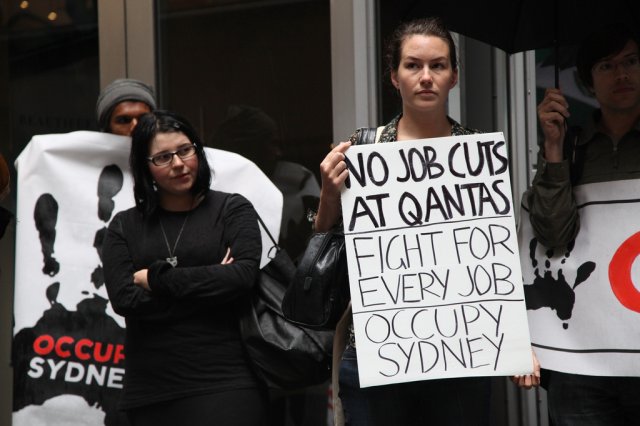
Occupy began as a movement against the effects and causes of the global economic crisis and against the austerity measures pushed by governments for the benefit of the 1%. In Australia, many people were inspired by Occupy Wall Street in New York and the global movement it had sparked.
When an international call for action on October 15 came out, we responded, and began our own occupations here.
Some chose to occupy because we were inspired by the mass movement of the indignados in Spain or the Egyptians in Tahrir square. We were inspired by their actions, but it was their message that we brought to Australia — the message that a small, powerful elite may run our societies, but an alternative is possible.
We came together in the spirit of international solidarity, but very quickly we had to make Occupy our own. We don’t have a dictatorship or such high unemployment in Australia, but we have proven the Occupy message is relevant here too.
Since Occupy kicked off in Australia, the big banks have announced record profits. The CEO of Qantas awarded himself a 71% pay rise (to more than $5 million) and then shut down the national airline — a business running at hundreds of millions of dollars profit — to bully Qantas staff campaigning for a small pay rise.
Occupy has pointed to the injustices that are so obvious in our society. We have found ways to speak to the 99% and show there is an alternative — that people have the power the change society and that the 99% are the only group that can make it happen.
We are sending a message to those who struggle to pay the mortgage or their energy bills, while the big banks make super profits. We think it wrong our society rewards the greediest among us — such as the billionaire Andrew Forrest who freely admits his multi billion dollar mining company Fortescue Metals hasn’t paid corporate tax in years.
Our determination to act against injustice, and find solutions to it, is the foundation of our movement.

That message brought us together. But the people involved have made it something more. Occupations in different cities have been confronted with many challenges. Together, we have overcome many of them and will overcome the others too as time passes.
The police and local governments have cracked down on our peaceful and lawful protests. In some cities, it took military-style raids to remove us. But repression cannot stop our movement from growing.
We have continued because no police officer or government can take away the things that define Occupy: our numbers and our message.
Going forward we need to be conscious of building on these two pillars. We need to make our message stronger. How exactly do the 1% cheat us in Australia? How can we involve more of the 99% in our cause? We need to speak out at every injustice, and be the unifying cause of these economic and political failings that affect us all.
And we need to make our people-power stronger. We need to be able to organise and involve people in suburbs, high schools and campuses. We need to support and involve migrant communities, rural communities and Indigenous Australians.
We will need the physical occupation sites, but we will need much more than this to truly reach everyone that we want and need to involve.
We need to develop strategies of how we can better build this movement. Occupy is something we can all contribute to. All participants must have ownership over its focus and direction.
We need all these things because this movement needs to win. We can’t afford another corporate bailout. We can’t take any more austerity. There is almost nothing left to privatise. The natural environment and climate can’t take any more abuse.
So together we need to build a movement that can win. We really have no other option.
Comments
Anonymous replied on Permalink
Anonymous replied on Permalink
Anonymous replied on Permalink
Anonymous replied on Permalink
Anonymous replied on Permalink